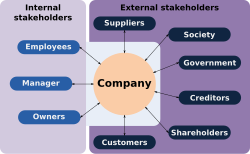Stakeholder concept

Imagine you have a lemonade store. You make lemonade and sell it to people who come to your store. These people are called customers. Your customers are not the only people who are interested in your lemonade store. There are other people who also care about your store, and they are called stakeholders.
Stakeholders are people who have an interest in your lemonade store. They could be your neighbors, your suppliers, your employees, your family, your city government, or any other group that might be affected by your store.
For example, your neighbors might care about your store because it affects the traffic on their street. Your suppliers might care about your store because they want to make sure you pay them on time. Your employees might care about your store because they want to keep their jobs. Your family might care about your store because they want you to be happy and successful.
Stakeholders can help or hurt your store, depending on how you treat them. If you treat your customers badly, they might stop coming to your store. If you treat your employees badly, they might quit and go work for someone else. If you don't pay your suppliers on time, they might not want to work with you anymore.
That's why it's important to think about all of your stakeholders and make sure you treat them well. You want to keep them happy so that they will help you succeed. That's what the stakeholder concept is all about: thinking about everyone who cares about your store and making sure you treat them well.
Stakeholders are people who have an interest in your lemonade store. They could be your neighbors, your suppliers, your employees, your family, your city government, or any other group that might be affected by your store.
For example, your neighbors might care about your store because it affects the traffic on their street. Your suppliers might care about your store because they want to make sure you pay them on time. Your employees might care about your store because they want to keep their jobs. Your family might care about your store because they want you to be happy and successful.
Stakeholders can help or hurt your store, depending on how you treat them. If you treat your customers badly, they might stop coming to your store. If you treat your employees badly, they might quit and go work for someone else. If you don't pay your suppliers on time, they might not want to work with you anymore.
That's why it's important to think about all of your stakeholders and make sure you treat them well. You want to keep them happy so that they will help you succeed. That's what the stakeholder concept is all about: thinking about everyone who cares about your store and making sure you treat them well.
Related topics others have asked about:
